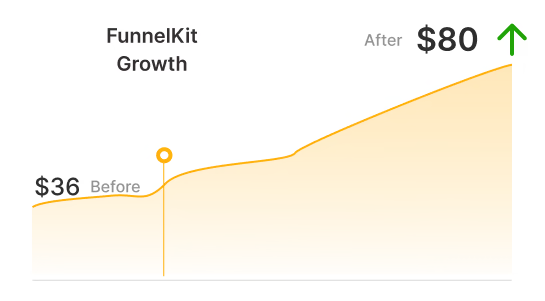
If you run a WordPress site, you know that your contacts are your most valuable asset. But managing them inside the default WordPress dashboard is nearly impossible.
That’s where a WordPress CRM (Customer Relationship Management) plugin comes in.
This tool is designed to organize, track, and automate your customer interactions without leaving WordPress.
The problem? The market is crowded and confusing. Between SaaS platforms, self-hosted plugins, and tools that promise everything but deliver very little, choosing the right solution can feel impossible.
As WooCommerce and marketing automation specialists, we at FunnelKit have tested the top WordPress CRM plugins. From helping thousands of store owners, we’ve seen what works, what doesn’t, and what actually drives results.
This isn’t just another generic list. In this guide, you’ll get a hands-on comparison of the best WordPress CRM plugins, the pros, cons, and key features of each solution.
You’ll also get an answer to the critical question: do you really need a full-blown CRM, or will a lightweight solution do?
By the end, you’ll have a clear roadmap to choose the WordPress CRM that fits your store, your workflow, and your growth goals.
Table of Contents
- 1 What is a WordPress CRM (and Do You Really Need One?)
- 2 How We Tested: Our 2025 WordPress CRM Review Methodology
- 3 SaaS vs. Self-Hosted: The Two Main Types of WordPress CRM
- 4 Top 5 Best CRM Plugins for WordPress
- 5 How to Choose the Right WordPress CRM: An Expert Buyer's Guide
- 6 Putting It All Together: How FunnelKit Automations Ticks Every Box
- 7 Frequently Asked Questions (FAQs) on WordPress CRM
- 8 Does WordPress have a built-in CRM?
- 9 What is the best free WordPress CRM?
- 10 What’s the difference between a CRM and Marketing Automation?
- 11 How to integrate CRM with a WordPress website?
- 12 What is the best WordPress CRM for WooCommerce?
- 13 Final Verdict: Are You Ready to Deploy the Best WordPress CRM Plugin?
What is a WordPress CRM (and Do You Really Need One?)
A WordPress CRM is a powerful customer relationship database tool that helps you manage all your interactions with customers and leads.
Think of it as a central hub for every contact, their WooCommerce purchase history, profile information, and position in your sales pipeline.
But here’s the secret: in our experience, most WordPress and WooCommerce site owners don’t actually need a full-blown CRM.
A common mistake we see is paying for an overly complex system when what you really need is a smart marketing automation.
CRM vs. Marketing Automation
CRM is a system of record, perfect for B2B teams that track deals through a long sales cycle (e.g., Initial Contact → Demo Scheduled → Proposal Sent → Closed).
Marketing automation, on the other hand, is a system of action.
It’s built to segment users and send the right message at the right time, such as abandoned cart reminders, welcome sequences, or win-back campaigns for inactive customers.
For most WooCommerce stores, 80% of revenue growth comes from smart marketing automation, not from managing a traditional CRM database.
Real Benefits of an Effective WordPress CRM
Here are some benefits associated with the WordPress CRM tool:
- Personalized communication: An efficient WordPress-focused CRM tool allows you to interact with your customers. You have all the data in one place and can tailor your messages the way you want.
- Efficient lead management: Without the right tools, managing leads can be challenging. However, a WordPress CRM tool can simplify lead management by tracking every interaction with your leads.
- Enhanced customer insights: A smart WordPress CRM integrates with WooCommerce, which helps you get access to valuable customer insights. These can include orders placed, customer details, items ordered, etc., that help you plan your next profitable campaigns more effectively.
- Streamlined sales process: With top WordPress CRM plugins, you’ll be able to get real-time data about your customers, orders, and inventory. This streamlined access to in-depth information allows you to improve your store’s checkout process and enhance conversions.
- Data-driven decision-making: With the detailed data available in one place, you can understand customer trends and sales patterns to formulate better strategies for optimum results.
How We Tested: Our 2025 WordPress CRM Review Methodology
To give you genuine, experience-based advice, we didn’t just read plugin descriptions.
Our team installed and configured each of the leading WordPress CRM solutions on a 2025 WordPress staging site running the latest versions of WordPress and WooCommerce.
We then evaluated each tool across five key criteria that matter most to store owners and marketers:
1. Ease of use
How intuitive is the dashboard? Can a non-technical WordPress user get started quickly, or does it require a steep learning curve?
2. WooCommerce integration
How well does the CRM actually sync with WooCommerce customer and order data? Can you easily filter or segment contacts by purchase history, lifetime value, or product category?
3. Automation power
What kind of triggers, actions, and workflows does it offer? Can it handle marketing automation tasks like abandoned cart reminders, post-purchase follow-ups, and win-back campaigns, or is it limited to manual contact updates?
4. Performance impact
Does the plugin slow down your WordPress admin or front-end performance? We measured load times, database queries, and overall responsiveness to see how each CRM scales with real-world data.
5. Pricing model and value
Is it a monthly SaaS-style subscription or a one-time plugin cost? Does the free plan actually deliver value, or is it just a paywall gate to the premium version?
This hands-on testing process gives us more than just feature comparisons. It provides real-world insights into which WordPress CRM plugins truly perform best for WordPress and WooCommerce users.
SaaS vs. Self-Hosted: The Two Main Types of WordPress CRM
Before you choose a plugin, it’s crucial to understand that not all WordPress CRM tools work the same way.
Broadly, they fall into two categories:
1. SaaS-based CRMs (with a plugin connector)
These are large, all-in-one cloud platforms, such as HubSpot or Salesforce, that store your customer data on their servers.
The WordPress plugin acts as a bridge, syncing your site data to their external dashboard.
Pros:
- Extremely powerful and feature-rich.
- No performance impact on your WordPress hosting.
- Handles email deliverability and infrastructure for you.
- Scales easily as your contact list grows.
Cons:
- Your customer data lives on their servers, not yours.
- It can get expensive quickly as contacts increases.
- Often overwhelming for smaller WooCommerce stores.
- Need to continuously switch between platforms for functionality.
2. Self-Hosted WordPress CRM Plugins
These tools run entirely inside your WordPress dashboard.
All data is stored on your own server, giving you complete ownership and tighter integration with your site.
Pros:
- You own 100% of your data with no external dependencies.
- Usually a one-time or flat annual cost (no per-contact pricing).
- Feels like a native part of the WordPress experience.
Cons:
- You’re responsible for email deliverability (via Amazon SES, SendGrid, etc.).
- Can consume server resources with large contact databases.
- It may lack the advanced enterprise features found in SaaS systems.
Which One Should You Choose?
If you value data ownership and affordability, go with a self-hosted WordPress CRM plugin.
If you prefer enterprise-grade tools and don’t mind paying for scalability and convenience, a SaaS-based CRM might be better.
Most WooCommerce store owners, however, find that self-hosted solutions strike the perfect balance between power, control, and cost.
Top 5 Best CRM Plugins for WordPress
Here are the 5 most popular WordPress CRM plugins as per their usability, features, and value for money.
| WordPress CRM Plugin | Best For | Key Features | Pricing | Our Rating |
|---|---|---|---|---|
| FunnelKit Automations | Self-hosted marketing automation and WooCommerce transactional email flows | Automation builder, visual email editor, broadcasts, unlimited contacts with unlimited automations/emails | Free. Pro starts at $99.50/year | 5 out of 5 |
| Jetpack CRM | Simplicity for freelancers and small businesses | Self-hosted, modular design, invoicing, quotes, and client portal | Free version available. Pro starts at $11/month (billed annually) | 4 out of 5 |
| WP-CRM System | Project management and client tracking inside WordPress | Project management focus, unlimited users, invoicing, and integrations | Free demo. Pro starts at $99/annually | 4 out of 5 |
| WP Fusion | Connecting/syncing WordPress plugins to an external SaaS CRM | Deep plugin integration (150+), bi-directional data sync, tag-based content control | Free plan. The premium version starts at $297/year | 3.5 out of 5 |
| Groundhogg CRM | Self-hosted marketing automation | Unlimited contacts, flat-rate pricing, visual funnel builder | 14-day free trial. Pro starts at $240/year | 3 out of 5 |
Let’s look at the plugins one by one.
1. FunnelKit Automations
As the creators of FunnelKit Automations, we built it to solve a problem where most "WordPress CRMs" are either clunky sales databases or overly simple email plugins.
FunnelKit Automations is a CRM plugin built for WordPress and WooCommerce. It’s an all-in-one multi-channel broadcast and marketing automation engine.
You can set up automated campaigns, send targeted email/SMS broadcasts, track shopping carts, view in-depth contact profiles, and more.
It gives you unlimited contacts and emails (you just need a sending service) and provides the deep, revenue-focused data that store owners actually need.
It’s best for businesses needing a complete marketing automation CRM with WooCommerce transactional emails and a detailed contact management system.
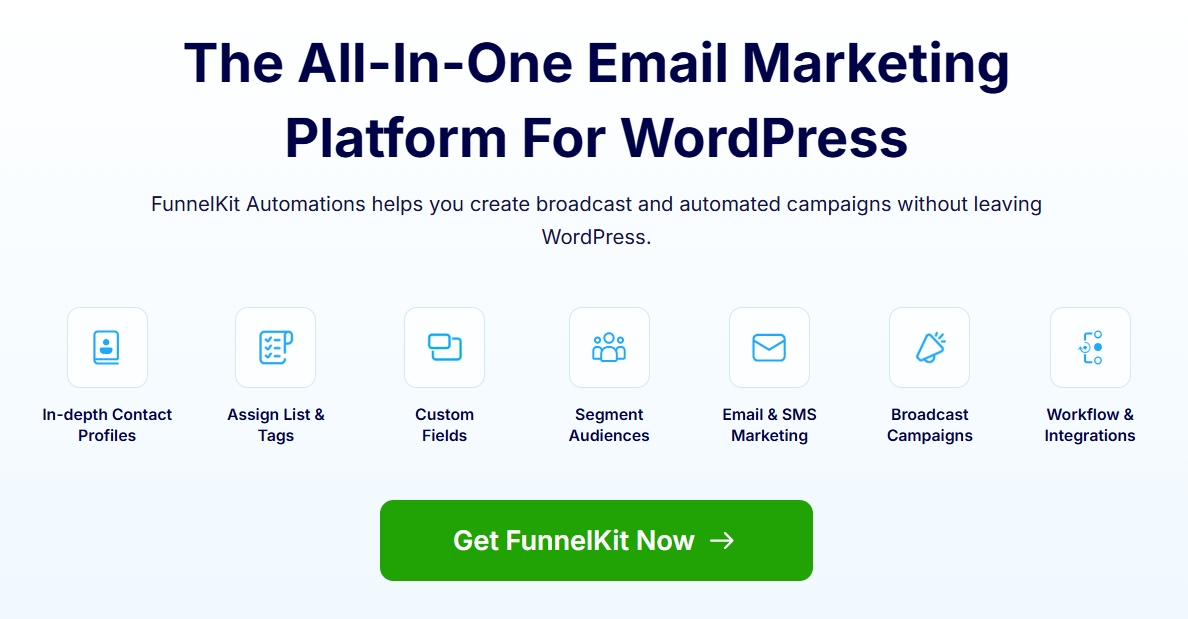
Key strengths:
- Pre-built recipes and automated sequences: Import and customize the pre-built automation recipes or set up your sequences from scratch. You can choose from a variety of events and actions to set up automations such as abandoned cart recovery, winback, post-purchase, upsells, and more.
- Drag and drop visual email builder: With this WordPress CRM, you can create irresistible emails by designing them using drag-and-drop blocks with the visual email builder.
- Dynamic coupon creation: Create and personalize dynamic, deadline-induced coupons that create a sense of urgency and encourage your shoppers to buy from your store.
- Targeted email and SMS broadcasts: Send targeted announcement emails and SMS campaigns to specific audiences, enabling shoppers to engage with your brand.
- Reporting and analytics: Track your campaigns’ performance in real time. Go beyond the usual open and click rate metrics to metrics that matter more, such as orders placed, revenue generated, conversions, etc.
Drawbacks:
- Lacks B2B sales CRM: It is a marketing tool, not a traditional B2B sales CRM. If you need to manage a team of salespeople with "deals" and "stages", this isn’t it.
- Doesn’t have tiered pricing plans: It doesn’t have tiered plans for the premium version, which could be a good or bad thing for users.
Pricing: The free version is available in the WordPress.org repository. Pro starts at $99.50/year. If you want the Funnel Builder and Automations bundle, the Professional plan costs $249.50 annually.
Customer reviews: 5 out of 5 (303 five-star reviews out of 309 total ratings)
Its lite version is the best free CRM plugin for WordPress, allowing you to set up cart abandonment and post-purchase email campaigns.
2. Jetpack CRM
Jetpack CRM is best for freelancers and entrepreneurs needing a simple tool for tracking leads, quotes, and invoices.
We tested Jetpack CRM (formerly Zero BS CRM) and found it's a fantastic digital rolodex. It’s crucial to understand this is not a marketing automation tool.
Instead, it focuses on the core client management loop, such as tracking new leads, creating quotes, sending invoices, and managing clients in a simple, clean interface.
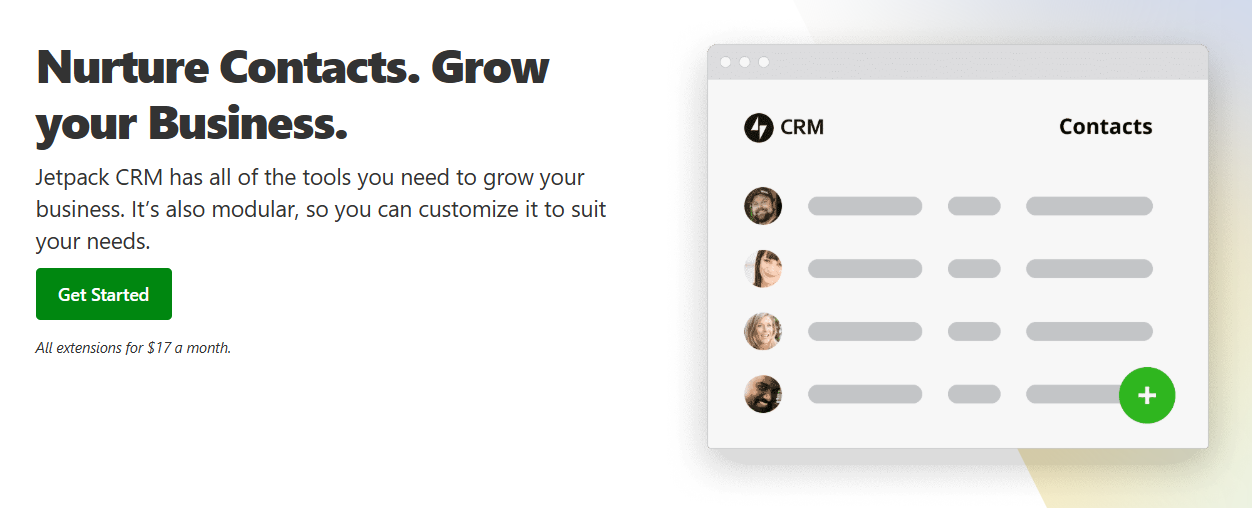
Key strengths:
- Keep track of everything in one place: Jetpack CRM gives you all the information about your business on the go. Get on top of your leads, manage your sales funnels, and view all your sales/revenue in one place.
- Nurture contacts and grow your business: Get a detailed view of your contacts' profiles and leverage the data to nurture them. This helps you to serve your existing customers better and find new customers.
- Track quotes, invoices and transactions: It lets you write and send proposals to users and generate invoices to get paid directly. It lets you track transactions per user contact or per company, making the process super easy.
Drawbacks:
- Weak marketing automation: It lacks the powerful visual builders and "if-then" logic of tools like FunnelKit Automations.
- Extension costs: The "free" plugin is a good start, but you'll need paid extensions for most of the real power.
Pricing: A free version is available in the WordPress.org repository. Its premium plan (freelancer) starts at $132/year.
Customer reviews: 4.3 out of 5 (118 five-star reviews out of 151 total ratings)
3. WP-CRM System
WP-CRM System is best for small agencies or teams that need to manage projects and clients inside WordPress.
This plugin surprised us. It's less a "CRM" in the marketing or sales sense and more a lightweight project management tool.
If your business (like a small design agency) needs to not only track clients but also the projects associated with them, this is a solid, self-hosted option.
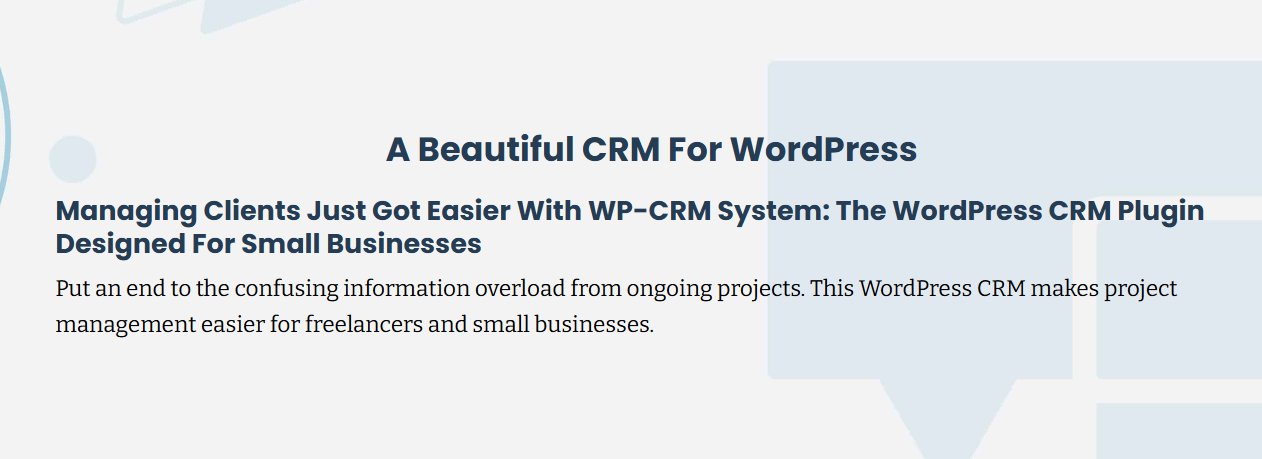
Key Strengths:
- Project management focus: This is its unique value. You can assign tasks and track project status right from the dashboard.
- Unlimited users: No per-seat licensing, which is great for a growing team. Manage your contacts' information easily.
- Core integrations: Connects to standard tools like Mailchimp, Gravity Forms, and Slack.
Drawbacks:
- Not a marketing tool: Like Jetpack, this is not for building complex email automations.
- Outdated interface: The UI is functional but feels dated compared to newer, React-based plugins.
Pricing: A free trial is available. The premium version starts at $99/year.
Customer reviews: Not available on their website.
4. WP Fusion
WP Fusion is best for power users who need to sync WordPress data (LMS, memberships, etc.) to an external SaaS-based CRM.
This is the most important distinction in this list: WP Fusion is not a CRM. It is a data synchronization plugin, and it's the most powerful one on the market.
We've used it for complex builds. Its job is to glue your WordPress plugins (like LearnDash, MemberPress, WooCommerce) and your external CRM (like ActiveCampaign, Keap, or HubSpot).
But to be honest, this job can be easily done with FunnelKit Automations.
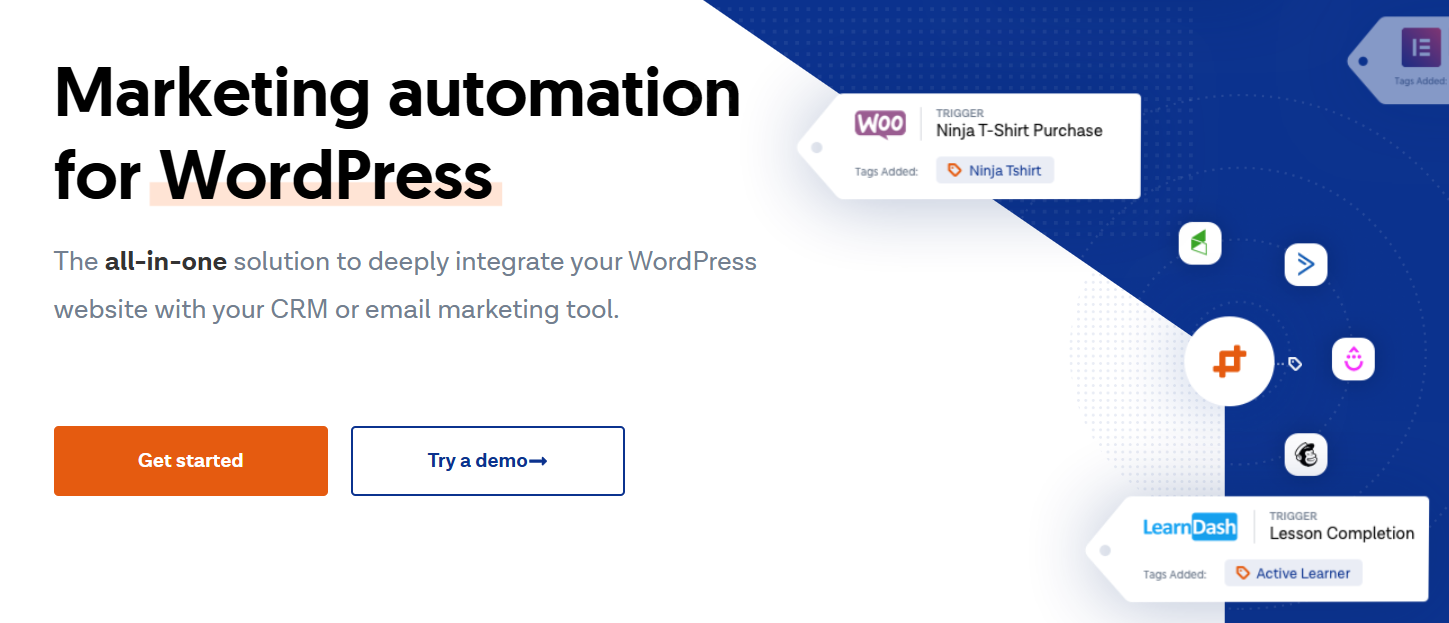
Key strengths:
- Deepest integrations: It supports over 150 plugins. If you run a complex membership or course site, this is your tool.
- Bi-directional sync: This WordPress CRM lets you seamlessly integrate your user data with WordPress. You can sync your extended user profile data, order numbers, and their details, etc.
- Tag-based control: You can show/hide content on your WordPress site based on a user's tags in your external CRM.
Drawbacks:
- Must have another CRM: This plugin does nothing on its own. You must also pay for a separate SaaS CRM (e.g., ActiveCampaign), making it a very expensive solution.
- Complexity: This is a professional-grade tool for power-users. It’s not for beginners.
Pricing: Get access to its free version on WordPress.org. A free demo is also available. The premium version starts at $297/year.
Customer reviews: 5 out of 5 (66 five-star reviews out of 67 total ratings)
5. Groundhogg
Groundhogg is a self-hosted solution for users who want both marketing automation and a sales pipeline.
Groundhogg’s goal is to give you the all-in-one power of a SaaS like HubSpot, but in a self-hosted plugin where you own your data.
In our testing, we found its visual funnel builder to be powerful, and it notably includes a sales pipeline feature, which is rare for a self-hosted tool.
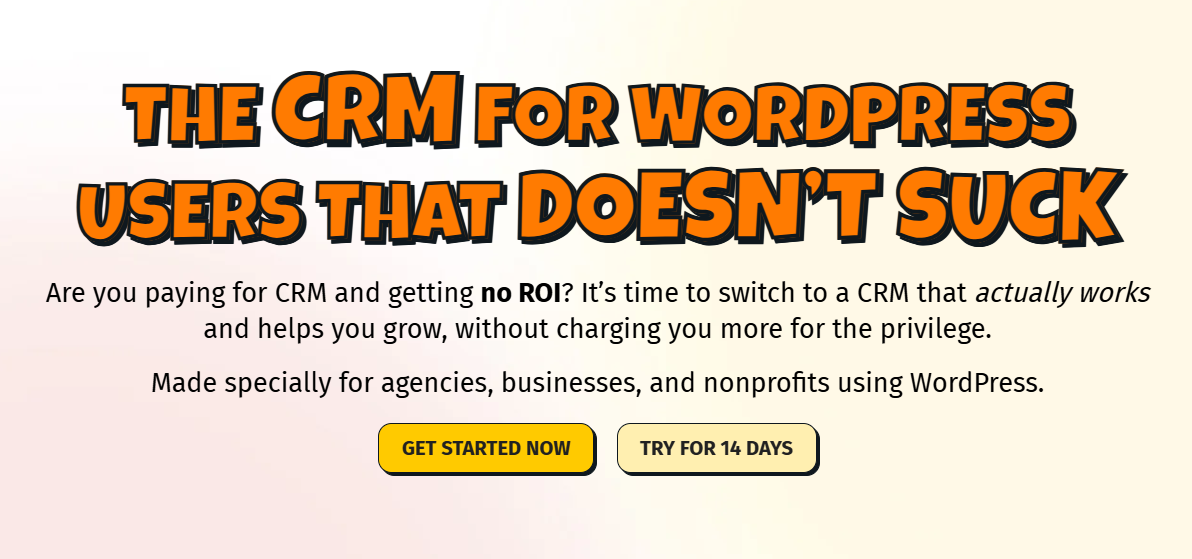
Key strengths:
- Tags and segmentation: Segment your contacts with tags or search filters to get a better overview of your users. Then leverage this data to boost engagement and sales with Groundhogg.
- Marketing automation: Create funnels and set up automated campaigns using 30+ integrations available to create highly effective customer journeys.
- Activity tracking and reporting: Track how your users interact with your WordPress website and measure your conversion stats.
Drawbacks:
- Heavy plugin: By trying to do everything (marketing + sales), it’s a heavier plugin on your server resources than more-focused tools.
- Pricing model: The pricing can be complex. You pay a base plugin fee, and then you may need to add paid extensions, which can add up.
Pricing: It offers a free version and a 14-day free trial. Pro plan starts at $240/year.
Customer reviews: 4.9 out of 5 (132 five-star reviews out of 141 total ratings)
How to Choose the Right WordPress CRM: An Expert Buyer's Guide
A great WordPress CRM is your growth engine. After evaluating dozens of tools over the years, we’ve found that the right CRM choice depends on clarity in two areas: your goals and the features that drive results.
Part 1: Your four foundational questions
Before comparing plugins, clarify these four essentials.
1. What is my real goal?
Are you trying to increase WooCommerce sales through automation and customer nurturing? You need a marketing automations CRM (like FunnelKit Automations or Groundhogg).
Or are you managing a longer, high-ticket sales pipeline? You need a Sales CRM (like Jetpack CRM or WP-CRM System).
Your goal defines your best-fit platform.
2. Where do I want my customer data?
SaaS CRMs store data on their own servers, which offers benefits such as reliability and zero maintenance.
Self-hosted CRMs keep everything on your WordPress site, benefiting from full control and privacy.
If compliance, data ownership, or EU privacy laws matter, self-hosted wins.
3. What is my budget?
SaaS tools like HubSpot can get pricey as your list grows.
Self-hosted CRMs like FunnelKit Automations usually have a flat yearly cost, making them predictable and affordable, even for larger lists.
4. How much tech work am I willing to do?
If you’re comfortable setting up your own email sending service (e.g., Amazon SES, SendGrid), go with self-hosted WordPress CRM.
If you prefer plug-and-play with everything managed for you, choose SaaS.
Part 2: The 6 Must-Have Features to Look For
These are the difference-makers we always evaluate before recommending a tool.
1. A revenue-focused performance dashboard
Most CRMs stop at open rates and clicks.
A true business CRM integrates with WooCommerce and shows actual revenue and order attribution, including which campaigns, automations, or emails are driving real sales.
2. Deep data segmentation
Segmentation is where personalization and profit happen.
Look for CRMs that let you filter contacts by:
- Order History: e.g., “Purchased Product X but not Product Y”
- Order Value: e.g., “AOV > $100”
- Customer Type: e.g., “Repeat buyer” vs. “First-time buyer”
- Location: e.g., “Contacts in the UK”
The more granular your filters, the better your marketing results.
3. 360-degree customer profiles
When you click a contact, you should instantly see their full story, including total lifetime value, purchase history, tags, automations, and engagement.
That’s how you make smart, one-to-one decisions, not at all driven by guesses.
4. A flexible visual automation builder
Automation is the heart of modern marketing. A helpful CRM lets you build visual workflows with smart event triggers and actions alongside:
- Delays (e.g., “Wait 3 days” or “Send next Tuesday”)
- Conditions (e.g., “If total > $50, send offer A; else send offer B”)
- Goals (e.g., “Stop sending once the customer buys”)
This flexibility separates basic drip sequences from revenue-driving automations.
5. An intuitive drag-and-drop email builder
Your marketing emails are your brand’s front line, and they must look polished and professional.
A top-tier WordPress CRM shouldn’t force you to code or rely on the classic WordPress editor.
Look for a tool with a built-in, visual drag-and-drop email builder.
It should let you design beautiful, mobile-responsive emails just as easily as you use any page builder.
This ensures every campaign stays perfectly on-brand while saving hours of design time.
6. A deep integration ecosystem
Your CRM should act as the central hub of your WordPress business. This means it must “talk” to the tools you already use.
Before choosing, check that your CRM offers native or easy integrations with:
- Form builders: Elementor Forms, Gravity Forms, WPForms
- Learning platforms (LMS): LearnDash, LifterLMS
- Membership and subscription tools: WooCommerce Subscriptions, MemberPress
The more integrated your ecosystem is, the smoother your automation workflows become and the less you rely on patchwork solutions or third-party connectors.
Putting It All Together: How FunnelKit Automations Ticks Every Box
Now that you’ve seen the 6-point expert checklist, the decision becomes much clearer.
As specialists in WooCommerce and marketing automation, we built FunnelKit Automations to solve these exact challenges.
We didn’t want to create just another plugin. Instead, we set out to build the marketing engine we always wished existed inside WordPress.
Here’s how FunnelKit Automations delivers on every part of the “Buyer's Guide” checklist:
- Revenue-focused dashboard
FunnelKit’s dashboard is built to track what matters most, i.e., revenue. Instantly see how much each automation or broadcast contributes to your bottom line.
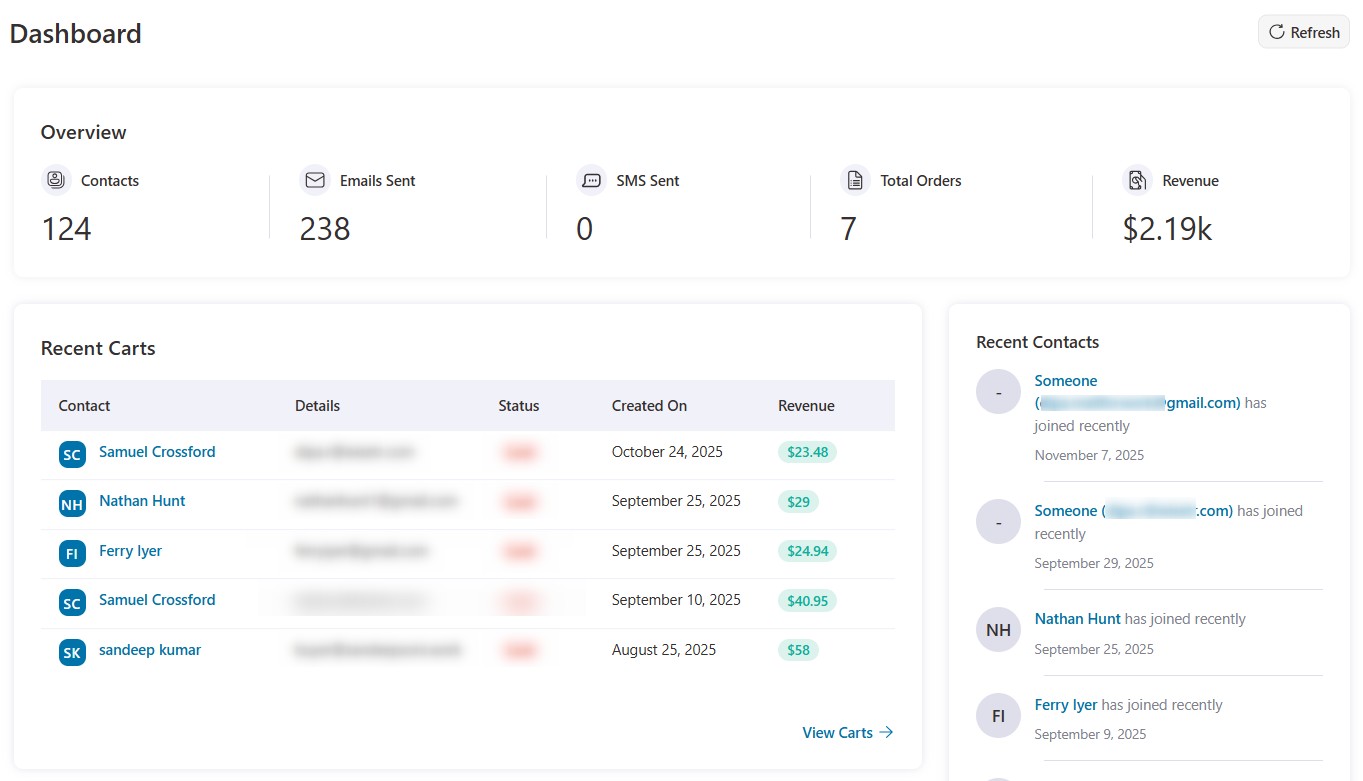
- Deep data segmentation
Our segmentation engine lets you filter contacts by AOV, purchase history, products in cart, first order date, and dozens of other key “money” metrics.
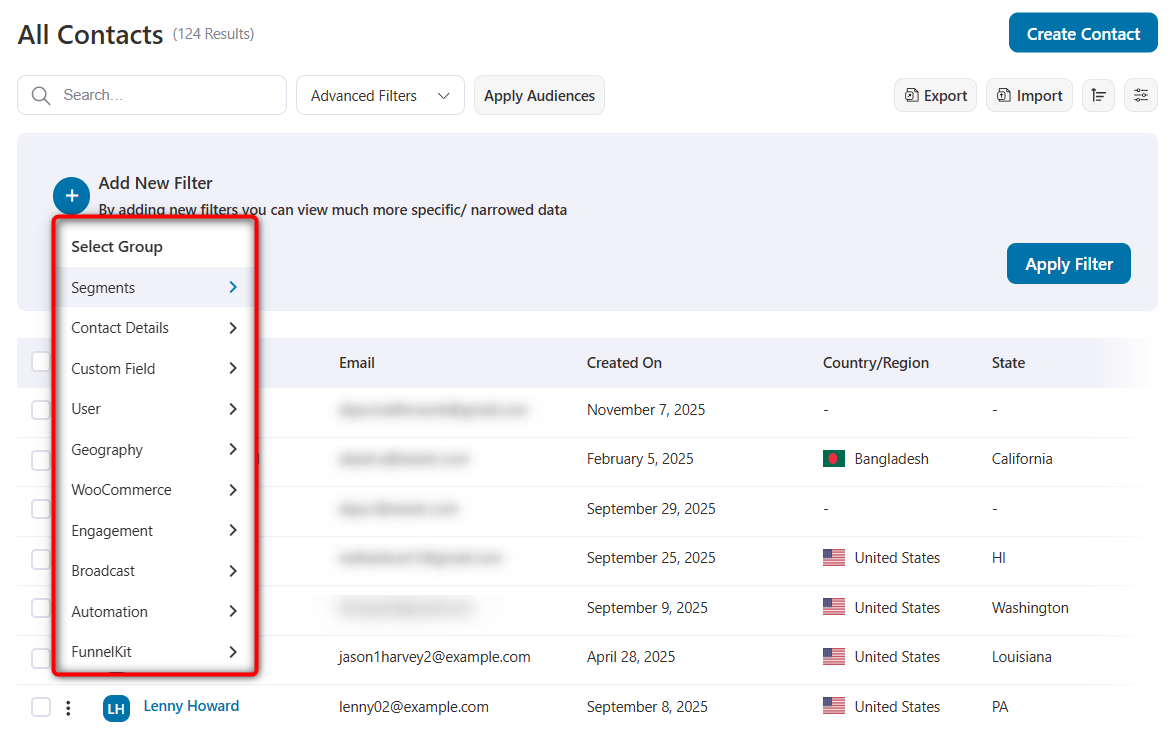
- 360-degree customer profiles
Get a complete picture of every customer, such as lifetime value, total orders, and a real-time activity feed on one clean, intuitive screen.
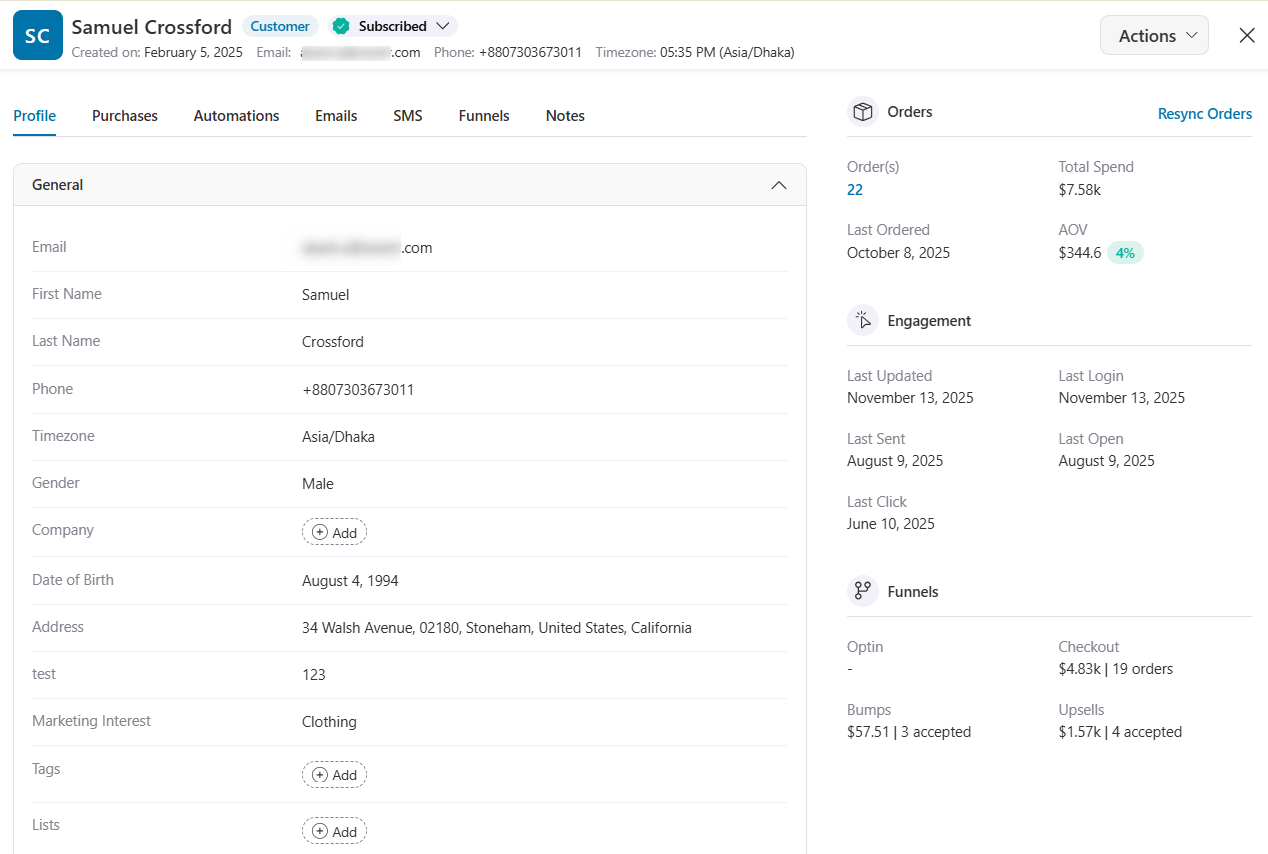
- Visual automation builder
This is the heart of FunnelKit. Our best-in-class drag-and-drop builder supports advanced logic, including delays, conditions, and goals, making it perfect for crafting sophisticated email and SMS flows.
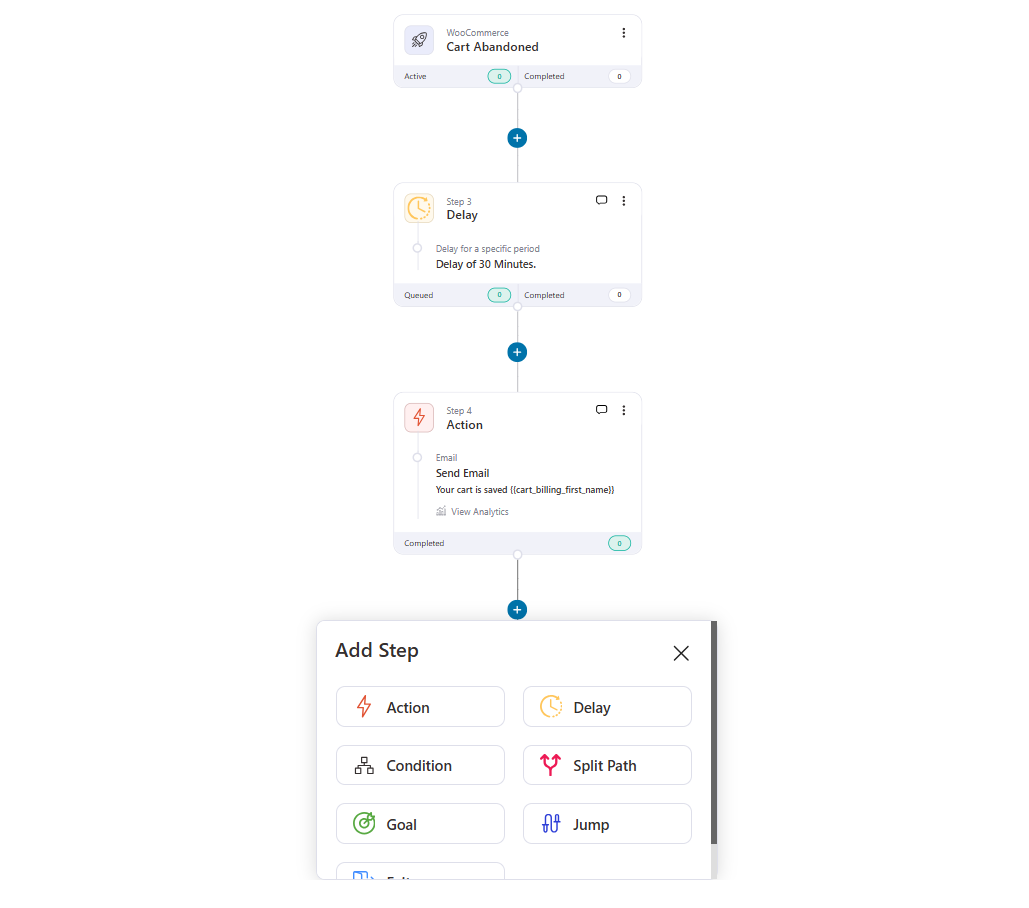
- Drag-and-drop email builder
Design beautiful, on-brand emails visually, no HTML or code required. Build stunning campaigns with drag-and-drop content blocks and merge tags.
Use dynamic WooCommerce elements, such as the order summary, coupons, product recommendations, cart items for abandonment recovery, and more, to set up automated emails that drive revenue.
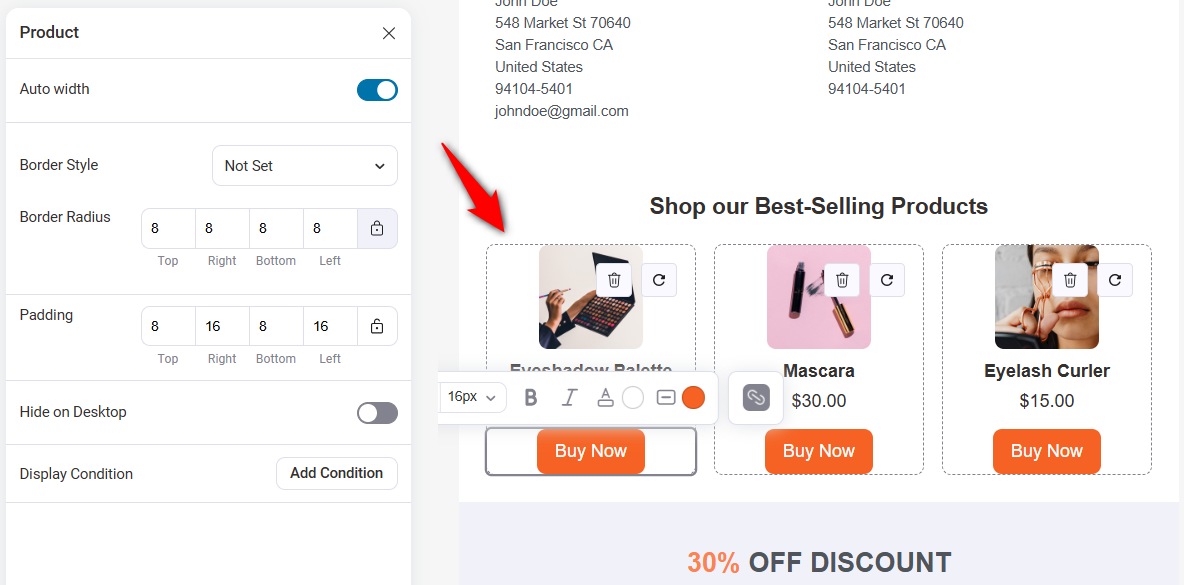
- Deep integration ecosystem
FunnelKit acts as your business’s “central hub”.
It seamlessly integrates with WooCommerce, Elementor, WPForms, LearnDash, MemberPress, WooCommerce Subscriptions, ActiveCampaign, HubSpot, and more.
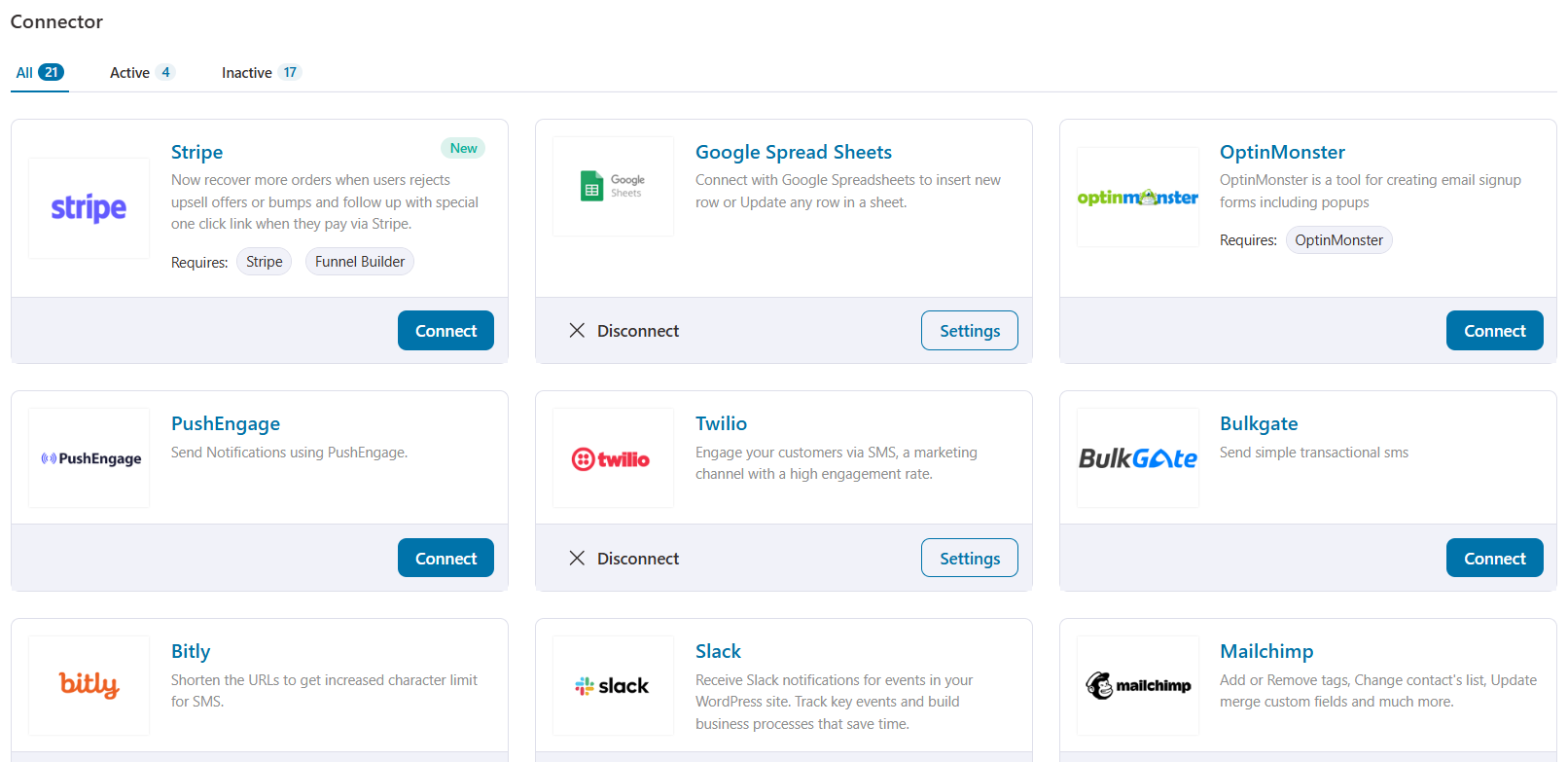
Frequently Asked Questions (FAQs) on WordPress CRM
Does WordPress have a built-in CRM?
No, WordPress does not include a built-in CRM system. It’s a Content Management System (CMS) meant for creating and managing posts or pages. It only supports basic user roles (like Administrator, Editor, or Subscriber).
If you want to manage customer profiles, track leads, or send marketing emails, you’ll need to install a dedicated WordPress CRM plugin such as FunnelKit Automations, Jetpack CRM, Groundhogg, and more.
What is the best free WordPress CRM?
It depends on your business type and data preferences. Plugins like FunnelKit Automations (Free) or Groundhogg (Free) give you control of your customer data within WordPress. You can manage contacts, send basic automations, and integrate with WooCommerce without leaving your dashboard.
What’s the difference between a CRM and Marketing Automation?
A CRM is a system of record, a digital filing cabinet that helps you store customer data and manage long, B2B-style sales pipelines (e.g., “Lead” → “Proposal Sent” → “Closed”).
Whereas marketing automation is a system that uses customer behavior to trigger automated messages, such as abandoned cart emails, welcome sequences, and win-back campaigns.
For most WooCommerce or online stores, marketing automation delivers faster, higher ROI than a traditional CRM.
How to integrate CRM with a WordPress website?
To establish the WordPress CRM integration, you just need to sign up for the CRM of your choice. Once done, install and activate it on your WordPress website. Some WordPress CRM plugins don’t require additional add-ons to work. For example, FunnelKit Automations is built for WordPress and WooCommerce to manage all your business processes from one place, single-handedly.
What is the best WordPress CRM for WooCommerce?
For most WooCommerce businesses, the best CRM has an effective marketing automation system designed specifically for eCommerce.
From that tool, you can segment customers by purchase history, AOV, and cart contents, send targeted campaigns to recover abandoned carts, automate follow-ups to increase repeat purchases and LTV.
That’s exactly what FunnelKit Automations is built for. It’s a complete WooCommerce marketing engine inside WordPress.
Final Verdict: Are You Ready to Deploy the Best WordPress CRM Plugin?
Choosing a WordPress CRM is one of the most important decisions you’ll make for your business, and as we've shown, it's a confusing landscape.
In our experience testing and building these tools, the single most common mistake is buying a heavy, complex system designed for a B2B sales team when what you really need is a smart, lightweight marketing automation engine.
Here is our final, expert recommendation based on your needs.
If you run a B2B or service-based business that relies on high-touch sales demos, proposals, and sales pipeline management, a traditional CRM like HubSpot is your best starting point.
If you are a freelancer who simply needs to track clients, projects, and invoices, a simple, self-hosted tool like Jetpack CRM or WP-CRM System is a smart, clean choice.
But for the vast majority of WooCommerce stores, bloggers, and course creators, the right choice is a CRM that wins in automating your marketing campaigns.
Our final advice is to start with your goal, not the tool. Don't pay for a complex sales pipeline until you actually have one.
We built FunnelKit Automations to be the revenue-driving engine that we, as WordPress and WooCommerce experts, always wanted.
It's the powerful, automation-first solution that helps you grow your store, build relationships at scale, and see your real revenue data without the bloat and complexity of a traditional CRM.
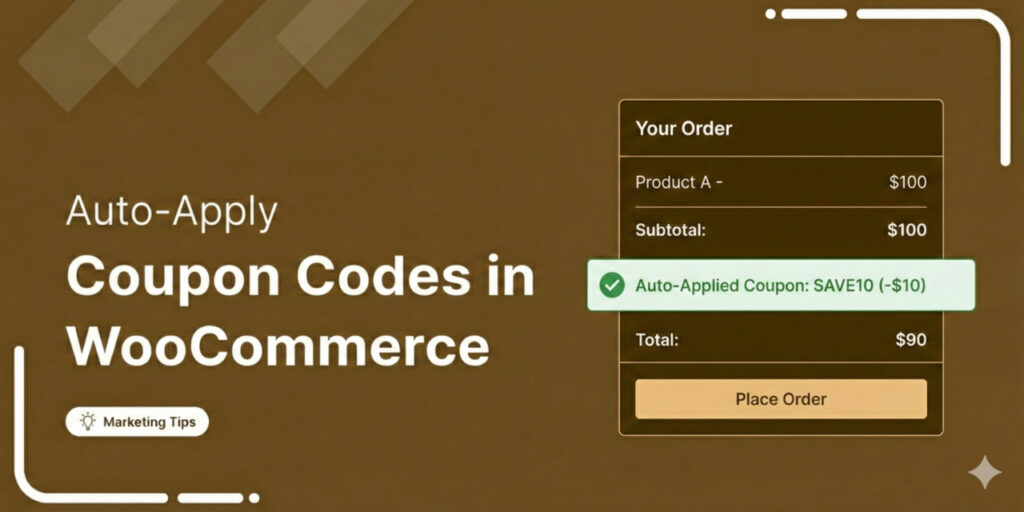
Editorial Team
February 17, 2026A WooCommerce auto apply coupon adds a discount to your customer's cart without them needing to type or paste a coupon code. Instead of relying on manual entry, the coupon...

Editorial Team
February 12, 2026First impressions matter, and in eCommerce, your welcome email is your first chance to shine. A WooCommerce welcome email is an automated message sent to new customers right after they...

Editorial Team
February 6, 2026With increasing competition and rising ad budgets, acquiring new customers is difficult. Forbes reports that the conversion rate for new customers is just 5%-20%. On the other hand, repeat customers...

